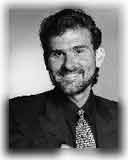Corey Allen '78

Arranger and composer Corey Allen has prospered on both sides of the music technology time divide. He began his Berklee studies in the 1970s when on-campus computers were more exception than rule, and in recent years, has made a name for himself as a preeminent expert in the art of using high-tech devices to help create music.
That expertise, and a large dose of musicianship have landed Allen, a composer, arranger, keyboardist, and producer, gigs with Chuck Mangione, Dave Koz, Manhattan Transfer, Diana Ross, and the St. Louis Symphony. He has also written for film, television, and theater productions, including the feature films Live Nude Girls and Just Cause and the television shows The Tonight Show with Jay Leno and Eye on Hollywood.
Now you can add the word "author" to Allen's multifaceted list of credits. His book, Arranging in the Digital World, scheduled for a March 2000 release by Berklee Press, is geared for teachers and musicians who are hoping to pump some life into digital arrangements.
"You have to build in imperfection," says Allen, thinking of scores of pianists who suddenly find at their fingertips the myriad musical options provided by new digital keyboards. "With quantizing and all the electronic tricks of the trade, it's easy to let your arrangements sound artificial and machine-like."
Drawing on his years of professional arranging, Allen guides his readers through a series of lessons such as "Style and Instrumentation," "How to Build an Arrangement," and "Sequencing Tips." Novice keyboardists will benefit greatly from the book's clear writing and straightforward exercises, but there's plenty of more seasoned players as well. One of the book's most useful components is its comprehensive listening list, which covers the breadth of music history and styles.
"Listening is how you practice arranging," Allen says. "You should listen to styles of music that you wouldn't generally listen to, and to instruments that you don't play."
Allen himself frequently dives into new musical territory and continues to work both on sides of the music technology time divide. His current writing projects include writing a Cole Porter revue and his own first symphony.
— Rob Hochschild



